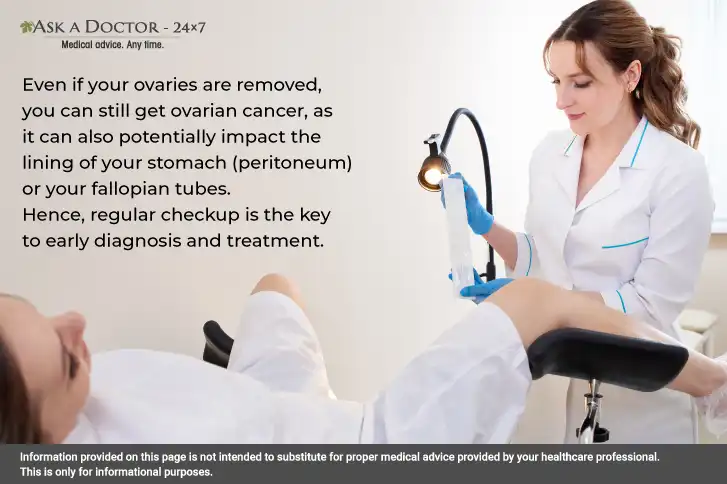Identify The Causes And Signs Of Ovarian Cancer
Any malignant growth that starts in the female ovaries (the organs that create eggs) can form a mass or tumor referred to as ovarian cancer. These cancerous cells can then spread (metastasize) to other parts of the body, making ovarian cancer a life-threatening condition. Do you know that ovarian cancer is referred to as a "silent killer?" Around 80% of cases of ovarian cancer are discovered only when the disease has progressed considerably. Due to delayed prognosis, in such cases 60 percent of ovarian cancers already spread to other parts of the body, bringing the five-year survival rate down to 30 percent from 90 percent in the earliest stage. Furthermore, ovarian cancer has a high chance of recurrence.
In the early stages, there are usually no symptoms, but in later stages, vaginal bleeding and lower abdominal pain or pressure can be experienced. In this blog post, we will explore the causes, symptoms, and treatment options for ovarian cancer, giving you the insights needed to judiciously care for your health or that of a loved one.
Causes of Ovarian Cancer

The exact cause of ovarian cancer is unknown, but medical professionals have found factors that may raise the risk of the condition. As people age, their chance of ovarian cancer also rises.
The risk of developing ovarian cancer may be increased if you:
- have inherited a defective gene, such as those associated with Lynch syndrome or the BRCA genes.
- Have a history of breast cancer or bowel cancer
- Have had radiation therapy for a prior cancer
- Have diabetes or endometriosis
- Had early onset of menstruation or had late menopause (over 55), or had no children—all of these conditions could indicate more ovulation of eggs.
- Taking hormone replacement therapy (HRT) or fertility treatment
- Are overweight or obese
- Smoke or use tobacco in any form
Symptoms of Ovarian Cancer
Ovarian cancer symptoms and indicators include:
- Pelvic pressure or discomfort
- Back or abdominal pain
- Unexpected vaginal bleeding
- Indigestion, bloating, and feeling of fullness quickly after eating
- Change in bowel patterns like frequent constipation or diarrhea
- Increased frequency of urination
Additional symptoms include:
- Indigestion and nausea
- Loss of appetite
- Weight loss
- Exhaustion and dyspnea
Remember, the symptoms may alter if cancer spreads to other areas of the body,
How to Prevent Ovarian Cancer?
Although ovarian cancer cannot be prevented completely, women can lower their risk by doing the following:
- Using oral contraceptives: Long-term usage of birth control pills has been shown to reduce the incidence of ovarian cancer.
- Prophylactic surgery: Women who have a high genetic risk of developing ovarian cancer may have their fallopian tubes and ovaries removed as a preventative measure.
- Keeping up a healthy lifestyle: Reducing alcohol intake, exercising frequently, and maintaining a healthy weight may all help lower the risk of ovarian cancer.
Ovarian cancer treatment will be based on the following factors:
- Location of your ovarian cancer
- Size and type of ovarian cancer
- Whether it has spread
- Overall health
Treatment Options For Ovarian Cancer
Surgery, chemotherapy, hormone replacement therapy, or targeted therapy are the methods used to treat ovarian cancer. Depending on how far the cancer has gone, surgery may involve removing one or both ovaries as well as the uterus. Since estrogen promotes the growth of cancer cells, hormone therapy is required to treat slow-growing ovarian cancer.
Conclusion
If someone is diagnosed with ovarian cancer in its early stages, all forms of the disease may be curable. Some types are also highly treatable in the later stages. However, it may be complicated to treat advanced ovarian cancer. Hence, regular cancer screening and seeking medical attention from your healthcare provider, if any symptoms appear, can often lead to an early diagnosis, increasing the chance of receiving effective treatment. Hence, women can be more prepared to advocate for their health and take preventative measures to lower their risk if they know the symptoms, causes, and available diagnostic and treatment choices.
If you have any questions related to ovarian cancer, Ask a Gynecologist or an Oncology Specialist at Ask a doctor, 24x7.
Recently Answered Questions Related to Ovarian Cancer
- What Causes Right Side Abdominal Pain While Suffering From Ovarian Cyst?
- Is The High WBC Count Due To The Ovarian Cancer?
- What Are The Symptoms Of Ovarian TB?
- Can Chemotherapy Cause More Facial Hair With Darker Facial Skin?
- What Causes Right Side Abdominal Pain While Suffering From Ovarian Cyst?
- What Causes Lower Left Abdominal Pain?
- Could The Fluid Lateral To Cecum Be Due To Rupture Of Ovarian Cysts?
- Can Prolonged Kenalog Injection Usage Cause Polycystic Ovarian Syndrome?
Disclaimer: Information provided on this page is not intended to substitute for proper medical advice provided by your healthcare professional. This is only for informational purposes.
Ask a Specialist
Recent Questions


